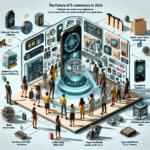Breaking Boundaries: The Latest Innovations Reshaping the Tech Landscape
In an era characterized by rapid technological advancement, the pace of innovation continues to accelerate, fundamentally altering the way we live, work, and interact. From artificial intelligence (AI) to quantum computing, various breakthroughs are reshaping the tech landscape and pushing the boundaries of what we thought was possible. This article explores some of the key innovations breaking new ground in technology and their implications for the future.
1. Artificial Intelligence and Machine Learning
AI and machine learning have become ubiquitous, transforming industries from healthcare to finance. AI algorithms analyze vast amounts of data, deriving insights that can lead to improved decision-making, personalized services, and automation. In healthcare, for instance, AI is used for predictive analytics, helping physicians identify potential health issues even before they manifest. Companies like OpenAI are developing advanced models, such as ChatGPT, which can engage users in natural conversation, helping businesses automate customer support and enhance user experience.
2. 5G Technology
The rollout of 5G technology marks a significant leap in telecommunications. With its ultra-fast speeds and low latency, 5G is set to revolutionize various sectors by enabling real-time communication and the Internet of Things (IoT). This technology supports dense networks, allowing numerous devices to connect simultaneously without sacrificing performance. For instance, in smart cities, 5G can power autonomous vehicles, provide real-time analytics for public transportation, and enhance security systems.
3. Quantum Computing
Quantum computing represents a paradigm shift in computing capabilities. Unlike traditional computers that use bits for data storage and processing, quantum computers utilize qubits, which can exist in multiple states simultaneously. This capability enables quantum computers to solve complex problems at unprecedented speeds. From drug discovery to cryptography and optimization problems, quantum computing holds the potential to revolutionize fields that require immense computational power.
4. Augmented Reality (AR) and Virtual Reality (VR)
AR and VR technologies are breaking boundaries in entertainment, education, and training. Companies like Facebook (now Meta) and Microsoft are investing heavily in these areas, creating immersive experiences that engage users in new ways. For example, VR is being used in medical training, allowing students to practice surgeries in a risk-free environment. In retail, AR enhances the shopping experience, allowing customers to visualize products in their homes before making a purchase.
5. Blockchain Technology
Blockchain technology is redefining how transactions are conducted and verified. Known primarily for its role in cryptocurrency, blockchain has broader applications, including supply chain management, healthcare, and voting systems. By providing a secure, transparent way to record transactions, blockchain can enhance trust and reduce fraud. Businesses are increasingly exploring decentralized finance (DeFi) and non-fungible tokens (NFTs), creating new economic models.
6. Sustainability and Green Tech
As the world grapples with climate change, innovations in green technology are becoming increasingly vital. Solar panels, wind turbines, and energy-efficient systems are just the beginning. Beyond renewable energy, advancements in battery technology (like solid-state batteries) and carbon capture solutions are helping to decrease reliance on fossil fuels. Additionally, tech firms are prioritizing sustainable practices in their operations, from reducing electronic waste to promoting circular economies.
7. Biometric Security
With increasing concerns about cybersecurity, biometric authentication is gaining traction as a more secure alternative to passwords. Fingerprint scanners, facial recognition systems, and voice identification are being integrated into devices and security systems, making unauthorized access significantly more challenging. Tech giants like Apple and Google are leading the charge, ensuring that user convenience is enhanced without compromising on security.
Conclusion
Innovation in technology continues to push the boundaries of what’s possible, leading to transformative changes across all sectors. The advancements discussed above are not just reshaping industries; they are also redefining human experiences and capabilities. As we navigate this wave of innovation, both individuals and organizations must stay informed and adaptable to thrive in an increasingly tech-driven world.
FAQs
Q1: What is the impact of AI on jobs?
A1: While AI automates repetitive tasks, it can also create new job opportunities in tech-related fields. The net effect on employment varies across sectors and requires a focus on workforce retraining.
Q2: How does 5G technology benefit consumers?
A2: 5G offers faster internet speeds, improved connectivity for multiple devices, and lower latency, enabling seamless streaming, better gaming experiences, and enhanced smart device interactions.
Q3: When will quantum computing become mainstream?
A3: Although quantum computing is still in its infancy, significant progress is being made. Mainstream applications are expected in the next decade as research and development continue to advance.
Q4: What are NFTs and why are they valuable?
A4: Non-fungible tokens (NFTs) are unique digital assets that represent ownership of a specific item, often digital art or collectibles. Their value is derived from scarcity, ownership, and the community surrounding them.
Q5: How can individuals promote sustainability in tech?
A5: Individuals can promote sustainability by supporting eco-friendly tech products, recycling electronic waste, and advocating for companies that prioritize sustainable practices in their operations.










